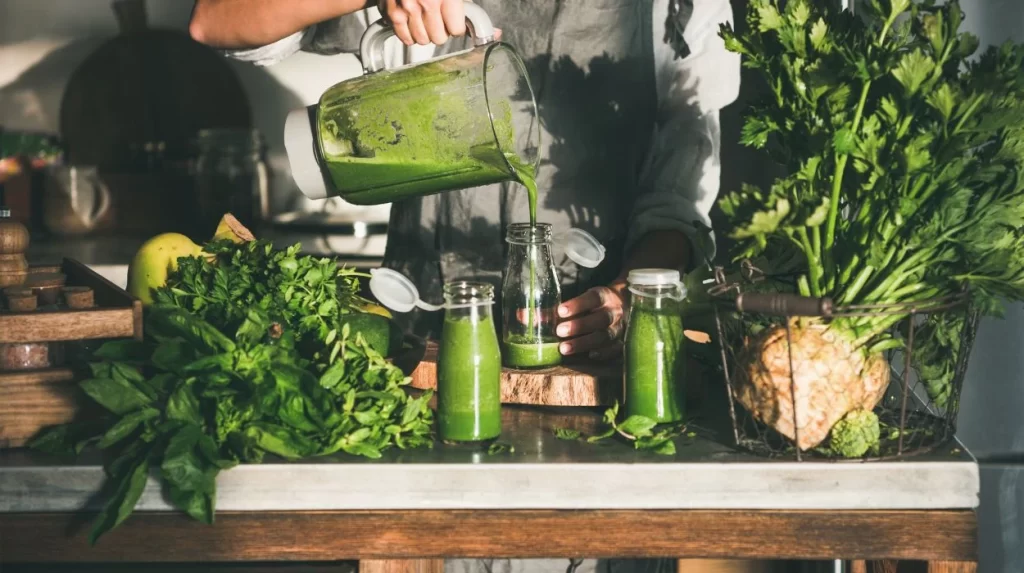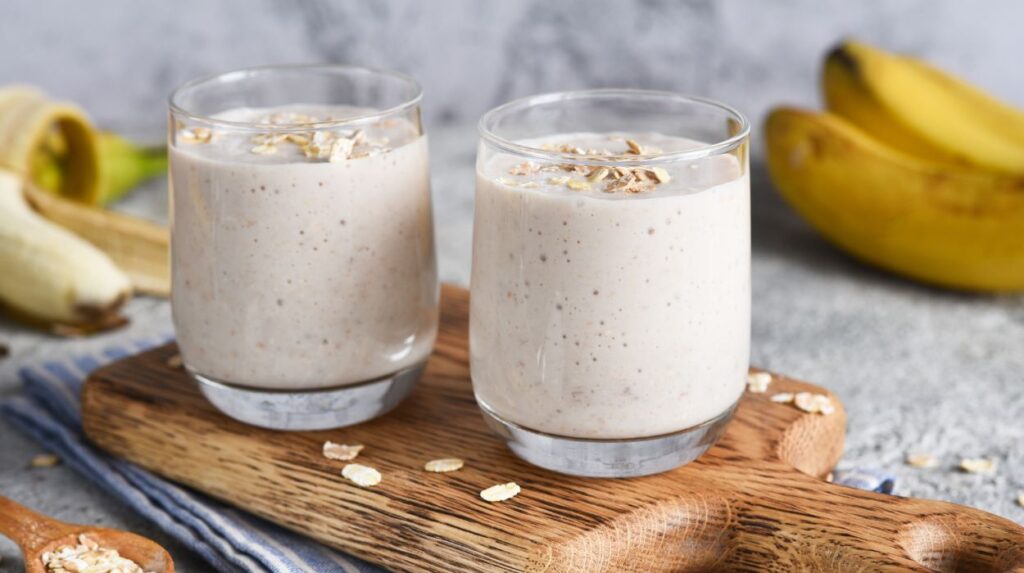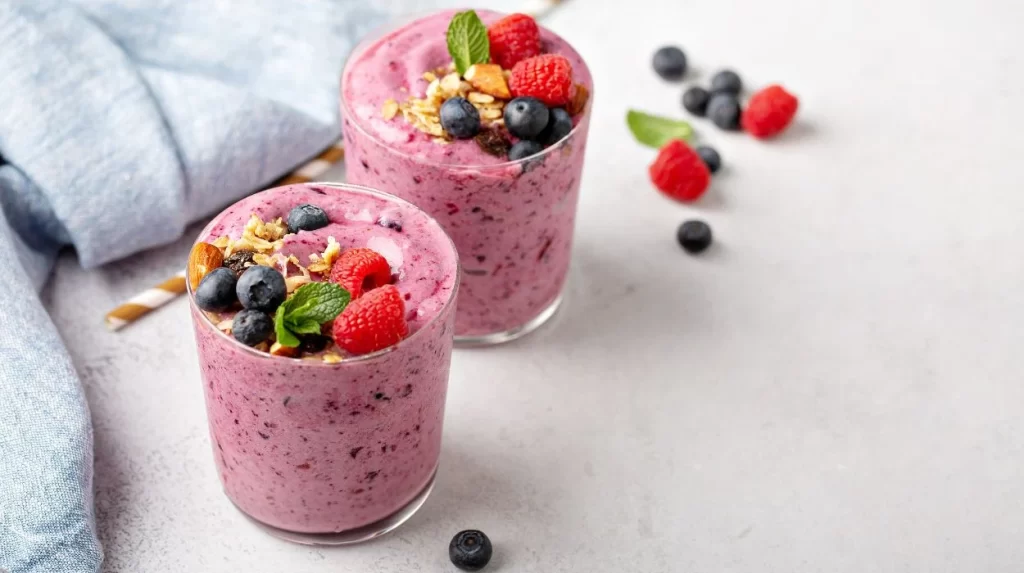If you’re living with diabetes, it’s important to make sure your diet supports your overall health and helps manage your blood sugar levels. One delicious way to do this is with smoothies for diabetics. Whether you make them at home or order them from your favorite meal delivery services, these delicious smoothies can be packed with essential nutrients, all while keeping sugar content to a minimum.
We’ve put together a list of 10 healthy and delicious smoothies for diabetes that you can easily whip up at home. These recipes focus on using a variety of fruits, nutrient-rich greens, and other nourishing ingredients that cater to your diabetic needs. As you explore these recipes, you’ll discover that you don’t need to sacrifice flavor to maintain a diabetes diet. So, go ahead and give these recipes a try – your taste buds and blood sugar levels will thank you!
10 Diabetic Smoothie Recipes To Try
10 delicious diabetic friendly smoothies:
- Strawberry Banana Protein Smoothie.
- Peach Smoothie.
- Greenie Green Smoothie.
- Snickers Smoothie.
- Chia Seed, Coconut, and Spinach Smoothie.
- Oatmeal Breakfast Smoothie.
- Berry Nut Smoothie.
- Green Tea Nut Smoothie.
- Peanut Butter Strawberry Kale Smoothie.
- Mango Almond Smoothie.
Smoothies For Diabetics: 10 Healthy Recipes
Incorporating diabetic-friendly smoothies into your daily routine is an excellent way to get essential nutrients without worrying about spiking blood sugar levels. Here are 10 delicious smoothie recipes specifically designed for people with diabetes.
Strawberry Banana Protein Smoothie
Ingredients:
- 1 cup frozen strawberries
- 1 ripe banana
- 1 scoop vanilla protein powder
- 1 cup unsweetened almond milk
- Stevia or monk fruit (optional)
- 1/2 cup ice cubes
Optional: You can also add a handful of spinach or kale to this smoothie for an extra boost of nutrients.
Nutrition: 305 calories; 43 g carbs; 27 g protein; and 4 g fat.
Peach Smoothie
The Peach Smoothie is simple to make.
Ingredients:
- 1 cup frozen peaches
- 1/2 ripe banana
- 1 scoop vanilla protein powder
- 1/2 cup plain Greek yogurt
- 1 cup unsweetened almond milk
- 1/2 teaspoon vanilla extract
- Stevia or monk fruit (optional)
Nutrition: 431 calories: 92 g carbs: 16.5 g protein: and 2 g fat
Greenie Green Smoothie

Ingredients:
- 2 cups fresh spinach
- 1/2 ripe banana
- 1/2 avocado
- 1/2 cup plain Greek yogurt
- 1 cup unsweetened almond milk
- Stevia or monk fruit (optional)
- 1/2 tsp vanilla extract
Optional: Add a scoop of protein powder to this smoothie for an extra protein boost. Additionally, you can add other greens like kale or collard greens.
Nutrition: 343 calories: 42 g carbs: 11 g protein: and 16.5 g fat.
Snickers Smoothie
Ingredients:
- 1/2 cup unsweetened almond milk
- 1/2 cup plain Greek yogurt
- 1 tablespoon unsweetened cocoa powder
- 1 tablespoon almond butter
- 1/2 teaspoon vanilla extract
- 1 scoop of chocolate protein powder
- 1/2 cup ice cubes
- Stevia or monk fruit (optional)
Nutrition: 213 calories:18 g carbs: 40 g protein: and 11 g fat.
Chia Seed, Coconut, And Spinach Smoothie
Ingredients:
- 1 cup fresh spinach
- 1/2 cup unsweetened coconut milk
- 1/2 cup plain Greek yogurt
- 1 tablespoon chia seeds
- 1/2 teaspoon coconut extract
- 1/2 cup ice cubes
- Stevia or monk fruit (optional)
Optional: You can also add a scoop of protein powder to this smoothie for an extra protein boost. Additionally, you can add other fruits like bananas or pineapples for variety.
Nutrition: 168 calories: 19 g carbs: 9.5 g protein: and 7 g fat.
Oatmeal Breakfast Smoothie

Ingredients:
- 1/2 cup rolled oats
- 1 ripe banana
- 1/2 cup plain Greek yogurt
- 1 cup unsweetened almond milk
- Stevia or monk fruit (optional)
- 1/2 teaspoon vanilla extract
- 1/2 teaspoon cinnamon
Optional: You can also add other fruits like strawberries or blueberries for variety. Additionally, you can add a scoop of protein powder to this smoothie for an extra protein boost.
Nutrition: 328 calories: 61.5 g carbs: 13.5 g protein: and 4.5 g fat.
Berry Nut Smoothie

Ingredients:
- 1 cup mixed frozen antioxidant-rich blueberries
- 1/2 cup unsweetened almond milk
- 1/2 cup plain Greek yogurt
- 1 tablespoon cashew butter
- Stevia or monk fruit (optional)
- 1/2 teaspoon almond extract
- 1/2 cup ice cubes
Optional: You can also add a scoop of protein powder to this smoothie for an extra protein boost. Additionally, you can use other nut butter like peanut butter or cashew butter for variety.
Nutrition: 262 calories: 33.5 g carbs: 11.5 g protein: and 11 g fat.
Green Tea Fruit Smoothie
Ingredients:
- 1 green tea bag
- 1/2 cup boiling water
- 1 cup frozen strawberries
- 1/2 banana
- 1/2 cup unsweetened almond milk
- 1/2 cup plain Greek yogurt
- Stevia or monk fruit (optional)
- 1/2 teaspoon coconut extract
- 1/2 cup ice cubes
Nutrition: 202 calories: 52 g carbs: 9 g protein: and 1.5 g fat.
Peanut Butter, Strawberry-Kale Smoothie
Ingredients:
- 1 cup fresh kale leaves
- 1 cup frozen strawberries
- 1 ripe banana
- 1 tablespoon peanut butter
- 1 cup unsweetened almond milk
- Stevia or monk fruit (optional)
- 1/2 teaspoon almond extract
- 1/2 cup ice cubes
Optional: You can also add a scoop of protein powder to this smoothie for an extra protein boost. Additionally, you can use other nut butter like almond butter or cashew butter for something a little different.
Nutrition (without honey): 256 calories: 39 g carbs:10 g protein: and 10.5 g fat.
Mango Almond Smoothie
Ingredients:
- 1 cup frozen mango chunks
- 1/2 banana
- 1/2 cup unsweetened almond milk
- 1/4 cup plain Greek yogurt
- 1 tablespoon cashew butter
- Stevia or monk fruit (optional)
- 1/2 teaspoon almond extract
Nutrition: 302 calories: 44 g carbs: 10 g protein: and 12 g fat.
Try experimenting with these recipes to find your favorite combinations and enjoy the health benefits and delicious taste. Always check the nutritional information to ensure the smoothie fits your dietary needs.
Are Smoothies Good For Diabetes?

Smoothies can be a healthy and delicious option for people with diabetes, but it is important to choose the right ingredients. Diabetes-friendly smoothies should prioritize fiber, vitamins, and minerals while minimizing added sugars and high-glycemic ingredients that could cause blood sugar spikes.
When crafting a diabetic-friendly smoothie, consider incorporating some of these nutritious and healthy ingredients:
- Leafy greens like spinach and kale are bonafide diabetes superfoods! They are packed with vitamins and minerals and are beneficial for blood sugar levels.[1]
- Berries such as strawberries, blueberries, and raspberries are low in sugar and fiber, making them a great choice for diabetic smoothies.
- Nuts and seeds, like almonds and chia seeds, can provide healthy fats and additional fiber, which can help stabilize blood sugar levels.[2]
- Protein sources, like Greek yogurt or whey protein powder, can help you feel fuller for longer and aid in managing blood sugar levels.[3]
When experimenting with diabetic smoothie recipes, avoid using fruit juices, sweetened yogurt, or added sugars, as these can increase your blood sugar levels. Instead, opt for unsweetened almond milk or plain Greek yogurt to provide a creamy texture without the added sugar.
Foods To Avoid For Diabetes
Monitoring your diet and consuming foods that help manage your blood sugar levels is essential to diabetes management. Some foods can spike your blood sugar levels, increasing your risk of diabetes-related complications. Here are some key foods you should avoid to maintain a healthy diabetic diet:
- Sugar-sweetened beverages: Avoid sodas, sports drinks, and fruit juices loaded with sugars. These drinks can cause a sudden rise in blood sugar levels and are linked to weight gain. Opt for water, tea, or coffee without added sugars instead. Choose monk fruit for sweetening.
- Processed snacks: Try to moderate your intake of packaged snacks that contain refined carbohydrates and added sugars, such as cookies, cakes, and candies. These foods lack nutrients and can quickly raise your blood sugar levels. Choose healthier snack options like nuts, fruits, and whole-grain crackers.
- Fatty meats: People with diabetes have a higher risk of developing heart disease.[4] Therefore, avoiding meats high in saturated fat can be crucial to diabetes management. Instead, go for lean meats like white meat, chicken, turkey, or fish.
- White rice and refined grains: Refined grains, like white rice and white bread, have a high glycemic index, which can cause rapid spikes in blood sugar levels.[5] Replace them with whole-grain alternatives such as brown rice, quinoa, and whole-grain pasta when possible.
- High-fat dairy products: Full-fat dairy products, like whole milk and regular cheese, can be high in saturated fats. Opt for low-fat or fat-free versions when possible.
If you find it challenging to manage these restrictions while still meeting your nutrient needs, supplements or meal deliveries for diabetes are an option worth considering. Also, consider meeting with a registered dietitian to address your individualized nutrition needs.
The Takeaway
Those living with diabetes can enjoy delicious and refreshing smoothies. Choosing the right ingredients and being mindful of the nutritional content can create blood sugar-friendly smoothies that taste great.
+ 5 Sources
- Wang, P., Fang, J., Gao, Z., Zhang, C. and Xie, S. (2015). Higher intake of fruits, vegetables or their fiber reduces the risk of type 2 diabetes: A meta-analysis. [online] 7(1), pp.56–69. doi:https://doi.org/10.1111/jdi.12376.
- Gervasi, T., Barreca, D., Laganà, G. and Mandalari, G. (2021). Health Benefits Related to Tree Nut Consumption and Their Bioactive Compounds. [online] 22(11), pp.5960–5960. doi:https://doi.org/10.3390/ijms22115960.
- Luhovyy, B.L. and Priya Kathirvel (2022). Food proteins in the regulation of blood glucose control. [online] pp.181–231. doi:https://doi.org/10.1016/bs.afnr.2022.05.001.
- Elisa Dal Canto, Ceriello, A., Lars Rydén, Ferrini, M., Tina Beck Hansen, Schnell, O., Eberhard Standl and Joline W.J. Beulens (2019). Diabetes as a cardiovascular risk factor: An overview of global trends of macro and micro vascular complications. [online] 26(2_suppl), pp.25–32. doi:https://doi.org/10.1177/2047487319878371.
- Åberg, S., Mann, J., Neumann, S., Ross, A.B. and Reynolds, A.G. (2020). Whole-Grain Processing and Glycemic Control in Type 2 Diabetes: A Randomized Crossover Trial. [online] 43(8), pp.1717–1723. doi:https://doi.org/10.2337/dc20-0263.
